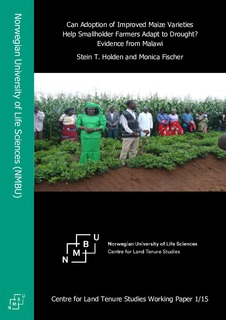Can adoption of improved maize varieties help smallholder farmers adapt to drought? : evidence from Malawi
Working paper
Permanent lenke
http://hdl.handle.net/11250/2479667Utgivelsesdato
2015Metadata
Vis full innførselSamlinger
- CLTS Working papers (HH) [119]
Sammendrag
This study used a three-year panel dataset for 350 Malawian farm households to examine the
potential for widespread adoption of drought tolerant (DT) maize varieties, a technology that
holds considerable promise for helping smallholder farmers in SSA adapt to drought risk.
Regression results revealed that DT maize cultivation increased substantially from 2006 to 2012, with the main driver being the Malawi Farm Input Subsidy Program. Some other key factors related to adoption were having recently experienced drought and farmer risk aversion. As far as yield performance, improved maize varieties performed significantly better than local maize during the 2011/12 drought year. However, DT maize did not perform significantly better than other improved maize varieties used in Malawi, which is in contradiction to results from on-station and on-farm trials (e.g., Magorokosho et al. 2010; Setimela et al., 2012). A plausible explanation is that farmers had inadequate training or experience to move towards the yield potentials of the DT maize varieties. Expansion of agricultural extension activities may be required to help farmers achieve the DT maize yield potentials and, subsequently, improve farmer resilience to drought.

